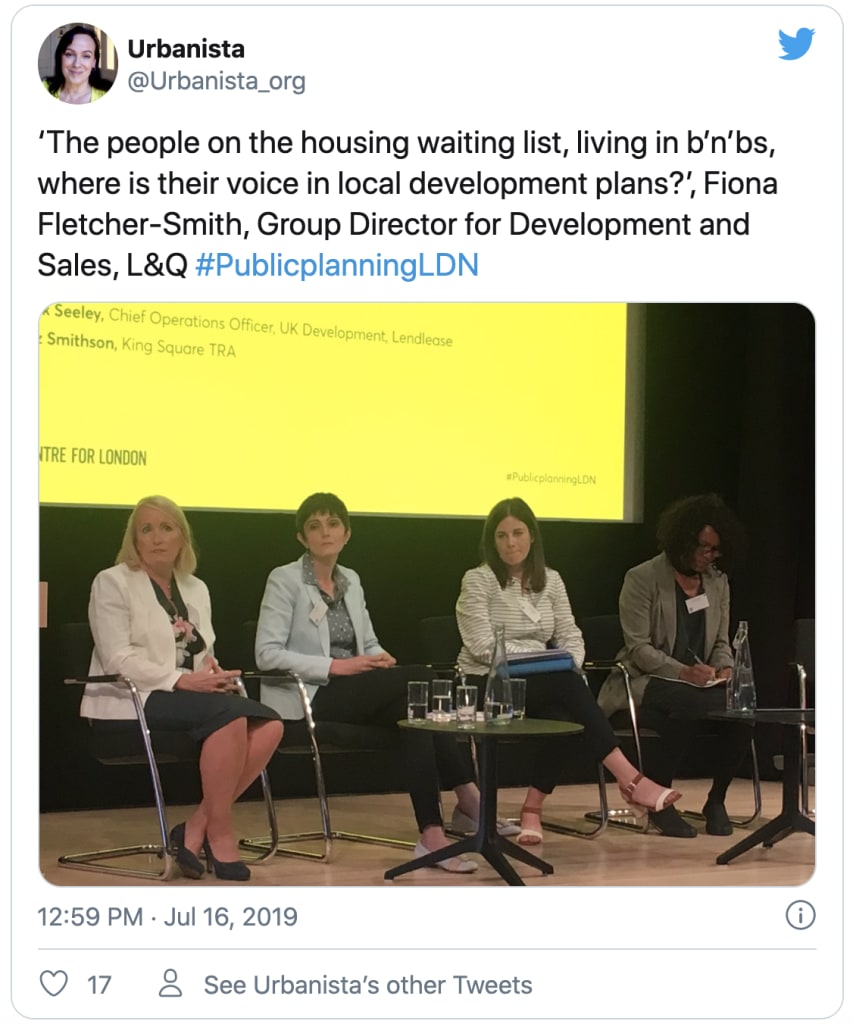
Last Tuesday, I attended ‘Developing trust: Strengthening public participation in London’s planning system.’ It was a conference hosted by Centre For London, an independent thinktank, watchdog and charity. The event’s focus was on planning in London (although the topics apply country-wide) – more specifically how the public interact with planning and development, what’s not working, and how it needs to change. There was an impressive line-up of speakers, with discussions from people on all sides of the issue: community groups, council leaders, elected members, housing developers. I learned lots of things. Here are the bits that I think are most important.
- Public trust in the planning process is abysmally low. Just 2% of people trust developers to act with honesty, and 7% trust their local council in matters of planning and development. Communities don’t feel that development happens in their area to benefit them: they feel it happens despite them. And, too often, it does: community groups are deemed a ‘risk’ to getting planning permissions through by planning departments and private developers.
- It’s been said before that simply building houses isn’t a solution to the housing crisis – what’s desperately needed is more social housing. This point came up at the event, alongside the position that those who need or rely on social housing are a demographic that aren’t likely to seek out and respond to a consultation, so more work needs to be done to hear the views of these groups.
- The current consultation model of many councils isn’t working. Communities feel excluded from the decision process: often a consultation will be published as a glorified box-ticking exercise once the decision is all but made, thereby increasing distrust between residents and local authorities/developers.
- Community groups get marginalised again and again, but we heard from some very inspiring activists who’ve done amazing work in their own neighbourhoods. They can be an invaluable resource, especially in terms of local knowledge – developers aren’t usually local to the area they’re building in. As Michael Ball from Waterloo Community Development Group said, ‘community groups are the canaries in the mine. [They] know what works and what doesn’t.’
Bit depressing, isn’t it? But it’s not all bad. What I really enjoyed about this event was that it wasn’t just a group of people talking in circles about how terrible things are. There were plenty of practical solutions to the issues shared and the audience was invited to participate as well. So, here are some ways that we can improve the relationship between residents, local authorities, and developers.
- A point that came up again and again was consult early. Getting the public involved from the outset can mitigate tensions and shape the development into something that truly adds value to the community and the wider area, rather than just altering the skyline.
- Consult well – think outside the box! We come across too many consultations where an organisation has uploaded a 60-page PDF and then gone ‘what do you think?’ It leads to low response rates and consultation fatigue. Putting the onus on the public to seek out these consultations and spend hours and hours responding to them is unfair. It also limits the demographic that can and will access the consultation. There are loads of different approaches – I’m a big fan of direct consultation; that is, taking it to the people. (You can read about a great example of this in our interview with Julie Klausen from Hamilton Council in NZ. Her team went into retirement homes with iPads and asked elderly people to respond to their 10-Year Plan consultation.)
- Give community groups a seat at the table. They know the area best and have invaluable insight to share. Eileen Conn of Peckham Vision made the point that redevelopment is not the same as regeneration. There must be a publicly agreed audit of what exists & its value, before deciding to tear a building down or develop something that already exists in another capacity. For example, Fiona Fletcher-Smith of L&Q said they were asked to fund a new community centre when there was an existing centre down the road that was on its last legs.
- Following on from the above: the vast majority of people don’t know anything about planning. It’s easy to forget that when it’s your job. This is why community groups are so important: they have more of a relationship with residents who aren’t activists, and also have a better chance of communicating with underrepresented groups.
- Be more open about money, trade-offs and compromises. Obviously there needs to be a balance between what’s needed and how much it costs. Developers should be more upfront about the costs involved with building, what they can do within the constraints of their budget, and how much profit they intend to make. This can increase understanding and trust from the public.
- Public participation doesn’t just have to mean traditional consultation. There was a general sense in the room that deliberative democracy models were an effective and inclusive way of making decisions.
These are all suggestions that align with our ethos here at Delib, and we make products designed specifically to help implement solutions like these. Dialogue is a discursive tool for hosting constructive conversations online – it’s ideal for pre-application discussions in planning. Simulator is a deliberative prioritisation tool that’s been used all over the world to involve the public in complex decision-making – it’s designed for mapping out trade-offs and compromises. And our flagship tool, Citizen Space, was designed to create a consultation process that’s more open, transparent and accessible to all.
To find out how our tools can help your organisation, you can get in touch any time.

